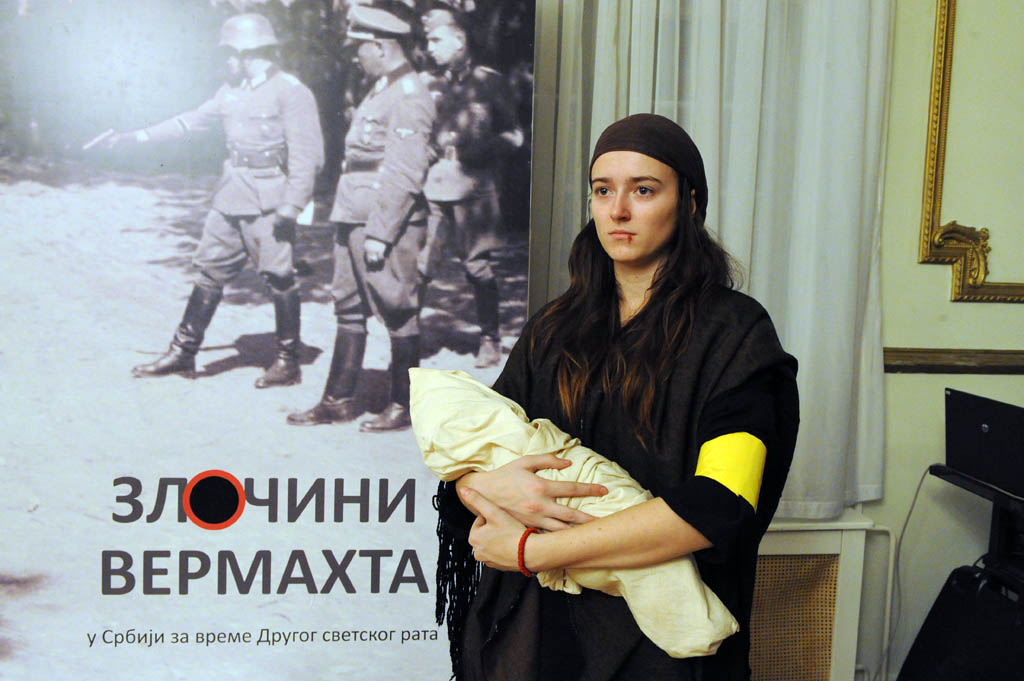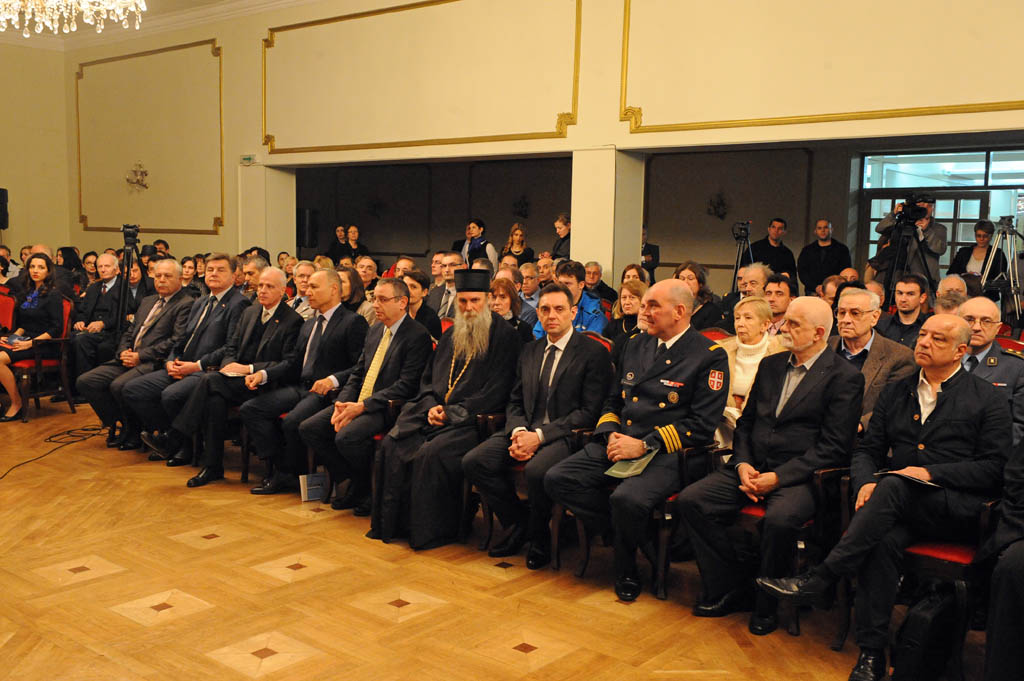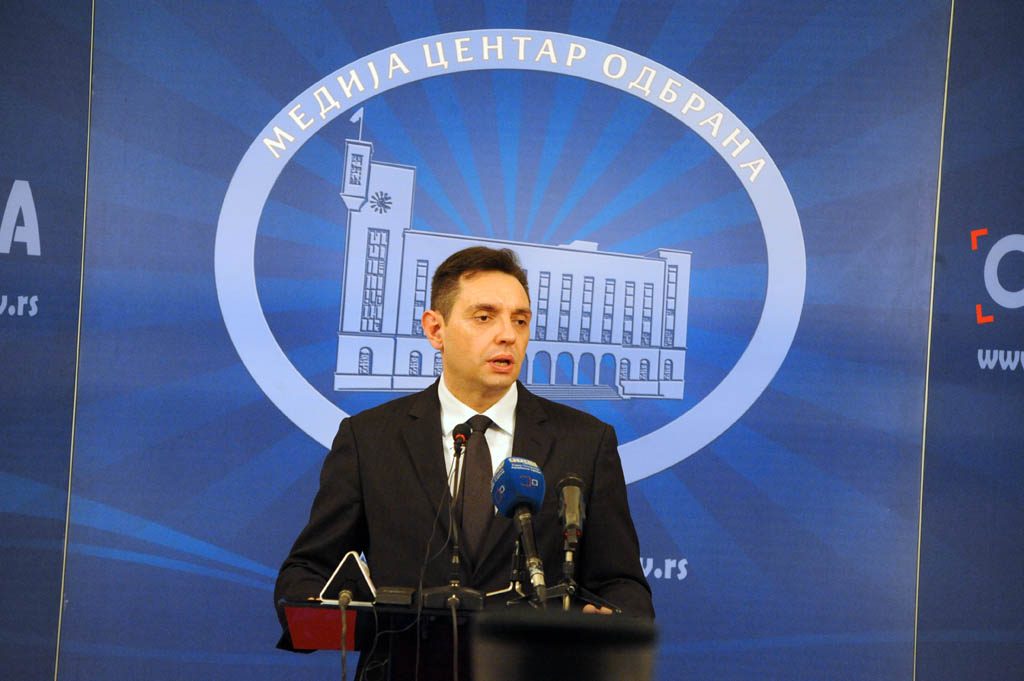- About MoD
Minister and Associates
- Minister
- State Secretary
- Assistant Ministers
- Secretary of the Ministry of Defence
Sectors
- Defence Policy Sector
- Human Resources Sector
- Material Resources Sector
- Budget and Finanance Sector
- SAF
- Documents
- Services
- Sport
- Archive
- Contacts
28.01.2015.
Exhibition "Wehrmacht's crimes in Serbia during WWII" opened
 Tonight, at the Gala Hall of the Central Military Club of Serbia, ceremonial opening was held for exhibition “Wehrmacht’s crimes in Serbia during WWII” organized on the occasion of International Holocaust Remembrance Day by the Ministry of Labor, Employment and Social Policy and Odbrana Media Center. Miroljub Filipovic Filimir, author of the exhibition, used texts and photographs, objects and films to portray the horrific crimes of the regular German military committed against civilian citizens in Pancevo i Jabuka, Sabac and Draginac, Krusevac, Kraljevo and Kragujevac.
Tonight, at the Gala Hall of the Central Military Club of Serbia, ceremonial opening was held for exhibition “Wehrmacht’s crimes in Serbia during WWII” organized on the occasion of International Holocaust Remembrance Day by the Ministry of Labor, Employment and Social Policy and Odbrana Media Center. Miroljub Filipovic Filimir, author of the exhibition, used texts and photographs, objects and films to portray the horrific crimes of the regular German military committed against civilian citizens in Pancevo i Jabuka, Sabac and Draginac, Krusevac, Kraljevo and Kragujevac.The ceremonial opening of the exhibition was attended by representatives of the Government of Serbia, Armed Forces and the Church, and numerous citizens, and the guests were addressed by Director of Odbrana Media Center Colonel Stevica Karapandzin, Episcope Slavonski Jovan, Chief Rabbi in Serbia Isak Asiel, representative of the Roma National Council Ljuan Koka, His Excellence Israeli Ambassador to Serbia Yossef Levy, Ambassador of Germany to Serbia Heinz Wilhelm and Aleksandar Vulin, Minister of Labor, Employment and Social Policy.
“I have to point out that whenever I am behind this stand, there is a symbolic meaning to it. Between 1941 and 1945, this building was used as Gestapo command for Southern Balkans. People were brought here, tortured, killed. Our people have a saying: Who takes revenge, does not commit. In this sense, I see the symbolism, for we at Odbrana Media Center do our best for the victims that died in WWII in this building not to be forgotten”, Colonel Stevica Karapandzin said while opening the ceremony.
Episcope Slavonski Jovan spoke about the previous day and its twofold importance. This is a grand religious holiday that celebrates the name of luminary St. Sava, and the International Holocaust Remembrance Day. Episcope Jovan also stressed April 22, as the date that awakes the memory of the genocide over the Serbian people.
“This is the day when the last prisoners in Jasenovac began their devastating exile. This is not the day they were slaughtered, but the day they rose with their heads up high, with human decency”, Episcope said.

Rabbi Isak Asiel reminded the guests of several “whys” that may never get their “because”: for example, why Hitler was so obsessed with the Jewish people.
“Not having answers to those questions takes the ground beneath our feet. Perhaps we will never have the answers to them; but, to abandon these questions would be the same as having it happen again, because old ideologies always wake and come back”, Rabbi Asiel concluded.
Representative of Roma National Council Ljuan Koka commended the Government for organizing the exhibition that displays history for the public.
“To forgive is Christian, to forget is heresy”, Ljuan Koka said.
Israeli Ambassador Yoseff Levy confirmed this.
“Seventy years after the liberation, I don’t know if the wound is quite open, but there is certainly a scar that often bleeds in our souls. Seventy years later, there are not many of those who survived the witnessing of the crimes. This is why the Ministry’s decision to tell the story of the holocaust is very important, so it would never happen again”, Ambassador said.
The audience was also addressed by German Ambassador to Serbia Heinz Wilhelm. His task tonight was not an easy one. Not even seventy years later.
“This exhibition shows pictures of horrific crimes German soldiers committed in Serbia. I, as every German, am ashamed that my people committed such crimes against humanity. With this invitation, the Government of the Republic of Serbia extends the hand of reconciliation, and shows its readiness to forgive”, Ambassador Heinz Wilhelm thanked Minister Vulin and organizers of the exhibition.
 At the end of the evening, Minister Aleksandar Vulin held a touching speech. He spoke about Auschwitz, about its ghosts and victims of an indescribable evil.
At the end of the evening, Minister Aleksandar Vulin held a touching speech. He spoke about Auschwitz, about its ghosts and victims of an indescribable evil.“This is an image that not even the scariest story could describe. Auschwitz is not a word. Not even a name. It is the sense that the evil exists. Even if someone had doubted that such an amplitude of evil was possible, they must have remained silent before the cruel image of Auschwitz”, Minister Vulin said. The story is horrific, but with a purpose, so that the history wouldn’t repeat, and this was the very purpose of this exhibition.
It is impossible to embellish horror, but Nocturno Choir certainly made the somber ceremony with its voice more bearable. The anthem Boze Pravde was sung first, followed by songs Svjati Boze and Tebe Pojem. Choir singer Boris Postovnik recited an excerpt from the sermon of German court priest Friedrich Griesendorf about Serbian prisoners.
At the end of the opening ceremony, respects were paid to killed civilians in Serbia during WWII with laying wreaths or stones at the Small Gallery of the Central Military Club.
The exhibition will be open until February 6, after which the exhibition setup will tour the country.
 PHOTOGALLERY
PHOTOGALLERY- About MoD
- Jurisdiction
- Organisation scheme
- Description of duties
- Minister and Associates
- Minister
- State Secretary
- Assistant Ministers
- Secretary of the Ministry of Defence
- Sectors
- Defence Policy Sector
- Human Resources Sector
- Material Resources Sector
- Budget and Finanance Sector
- Special Internal Units
- Secretariat
- Office of the Minister of Defence
- Military Attorney's Office
- Administrative Bodies within MoD
- Defence Inspectorate
- Military Intelligence Agency
- Military Security Agency
- Autonomous Departments
- Public Relations Department
- Military Healthcare Department
- Higher Education Institution
- Defence University
- Specific internal units
- Inspector General of the Services
- Internal Audit Section
- SAF
- Documents
- Regulations
- Laws
- Rulebooks
- Official Military Gazette
- Decisions
- Public Hearings
- Strategies
- National Security Strategy
- Defence Strategy
- White Paper on Defence
- Total Defence Concept - summary
- Medium Term Plan of the Ministry of Defence
- Budget
- Budget Implementation
- Audit Data
- Data on Additional Resources
- Other
- Action Plans
- Integrity Building
- Services
- Sport
- Archive
- Contacts

